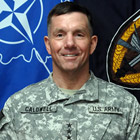"a soldier interacting, without mediation"


Education
Kairos: Your September 12, 2007, guidelines to officers for dealing with the media—"Be honest; be open; be relevant; be ready" (Caldwell, 2007a)—could be interpreted as a recommendation to attend to the components of the rhetorical situation: promote attention to the ideas or substance of your message, be seen as an approachable and authoritative communicator, tailor your message to the needs and values of your audience, and attend to the context and timeliness of your message. According to rhetoricians, those four elements of the rhetorical situation (message, author, audience, and context) correspond in some ways to Aristotle's four classical appeals (logos, ethos, pathos, and kairos). What lessons about educating, communicating, and persuading with digital technologies can rhetoricians—and academics—take from the Army, particularly from your experiences in encouraging faculty and students of the Command and General Staff College to keep weblogs as part of their curriculum and writing requirements? What does the military want or need most from scholars who work with rhetoric, technology, and pedagogy; and what do the officers you've encountered at the Command and General Staff College and elsewhere need to learn most in terms of communicative and rhetorical skills in the networked age?
Lt. Gen. Caldwell: Not to be afraid! Our current Army has an interesting mix of generations with dramatically different comfort levels with technology and the information environment. We have young soldiers who have never known life without a PC and a cell phone, and we have people who are a little older who remember rotary phones and party lines. The key is to encourage everyone at all levels to try it out and engage with a new audience; to see what happens and who comments when you post a blog on the NTM-A website; to do an interview with a reporter from the Associated Press or The New York Times; to post an update on Facebook. We know that technology, new media, and social media are here to stay and will continue to shape the world we live in. As a senior Army leader it is my duty to arm my subordinates with the tools and understanding necessary to not just get by, but excel in their missions. It is essential in the Army that we are transparent and have credibility. That is achieved through an open interaction, which engages and informs the public. One of the best ways I know to achieve this is through social media and information engagement.
Kairos: In a story in the October 2009 issue of The Enduring Ledger celebrating the building of the first library for the Afghan National Army's 201st Corps, USAF Capt. Charles Johnson noted the estimate that "9 out of 10 Soldiers in the ANA are illiterate," and paraphrased USAF Capt. Derek Williamson's observation that "illiteracy keeps men ignorant and easily controlled" (Johnson, 2009, p. 11). In such an environment, it might seem useful to follow scholar Anne Wysocki's (2004) advice to "help readers/consumers/views stay alert to how any text—like its composers and readers—doesn't function independently of how it is made and in what contexts" (p. 15). Wysocki advocated for composing texts "that make as overtly visible as possible the values they embody" (p. 15), which would seem to align well with the counterinsurgency project commonly characterized as "winning hearts and minds." Beyond the basic literacy skills that US contractors are teaching to ANA soldiers, what types of attention are the CSTC-A and NTM-A considering devoting to critical literacy and composing skills?
Lt. Gen. Caldwell: Literacy is one of the key programs that we have in NTM-A. Being able to read and write are essential skills that are needed for all members of the Afghan police and army, and we are actively working on a variety of programs to enhance literacy in all that we do. This includes including literacy programs in the Basic Police Training Programs and the Afghan National Army's Basic Warrior Training. It includes literacy programs in the Non-Commissioned Officer Courses and in the Afghan Police Training Teams. Just recently we added a literacy class to the Afghan National Army's paralegal school. We are continually looking for opportunities to include literacy programs throughout the entire training and education opportunities. The response is tremendous; one of the primary reasons why the police and army re-contract is because of the literacy programs. There is a desire to improve literacy throughout the Afghan National Security Forces that is overwhelming—which is why this is one of our key programs to enhance the professionalization of the force.
One of the things we discovered when we first arrived is that having a pen in a pocket is a visible sign of literacy and a point of pride—of course, only people who can read and write would have use for a pen in the pocket! This desire to be able to read and write, and the pride that you can see when young Afghans pass that first literacy test, just touches your heart. Literacy is a transforming skill for both the individual and the country—and we're doing all we can to help meet that need.